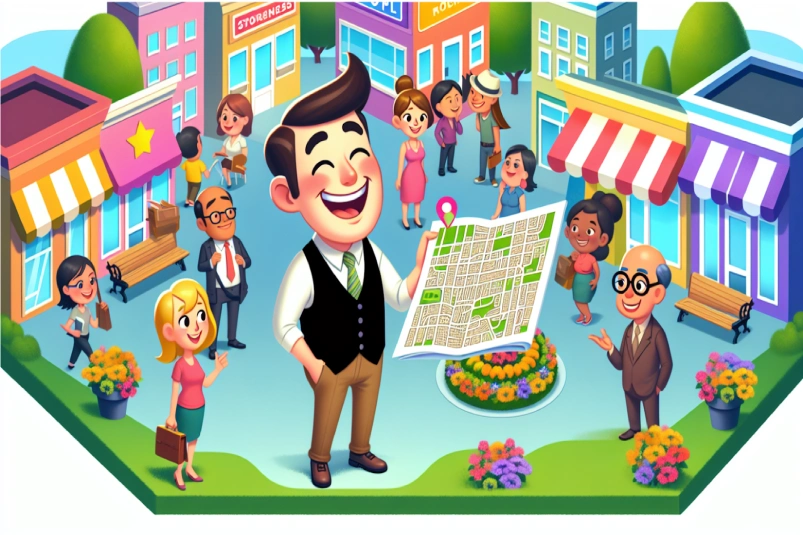
40 Best Real Estate Marketing Strategies for Success in 2024
In the competitive world of real estate, effective marketing strategies are crucial for success. From building a robust online presence to leveraging social media and email campaigns, there are numerous ways to attract and retain clients. This article explores the 40 best real estate marketing strategies for 2024 to help you stay ahead.
Key Takeaways
- Develop a robust online presence with a professional, mobile-optimized website to attract potential clients effectively.
- Utilize engaging social media content and targeted ads to strengthen your brand and reach the right audience.
- Invest in strong client relationships through email marketing, community engagement, and personalization strategies to generate referrals and repeat business.
Build a Strong Online Presence

In today’s digital landscape, a professional website is crucial for real estate agents. Often the first point of contact, a well-designed site can greatly influence potential clients’ perceptions. Many consumers expect real estate businesses to have a functional website; a poorly designed one can turn them away. Regular updates, user-friendly navigation, and integrated features like mortgage calculators and contact forms enhance user experience and boost lead generation.
An effective online presence builds trust and encourages potential clients to engage with your services. Being accessible online broadens your reach, allowing you to showcase listings more effectively. In the competitive real estate market, this could be the key to attracting and retaining clients.
Features like mortgage calculators and contact forms enhance user experience and facilitate lead generation. Keeping your website updated and user-friendly ensures it remains a valuable marketing tool.
Optimize for Mobile
With 59% of users browsing on mobile devices, mobile optimization is crucial for capturing leads. A non-mobile-friendly site risks losing valuable prospects. Implement large buttons and a home search tool for easier navigation, enhancing the mobile user experience.
Mobile optimization caters to the growing number of mobile users, providing a seamless experience. This enhances user engagement and helps retain clients who prefer browsing on their devices.
Enhance User Experience
User experience is vital for real estate websites, ensuring visitors can easily navigate and find needed information in the home buying process. Enhancing site navigation, loading speed, and design boosts user engagement. Relevant details like price and specifications should be easily accessible.
Clean layouts and minimalist elements contribute to an effective website design. By focusing on user experience, you increase the likelihood of visitors staying longer and converting into clients.
Implement SEO Best Practices
Search engine optimization (SEO) improves website ranking, visibility, and attracts organic traffic. Optimizing your Google Business Profile boosts local search ranking and acts as a second homepage. Tailoring content based on geographic location helps address the specific needs of different neighborhoods or regions.
Using personalized hashtags and other effective SEO practices can boost online visibility and engagement, driving more traffic to real estate websites. Implementing these practices ensures your website attracts the right audience, leading to more leads and conversions.
Leverage Social Media Platforms
Social media marketing builds trust by showcasing your personality and expertise. An active social media presence establishes you as a trusted advisor. Utilizing platforms like Facebook, LinkedIn, and TikTok helps reach potential buyers more effectively.
Social media engagement drives interest in your brand and helps potential clients understand who you are. Incorporating engaging content, relevant hashtags, and targeted ads creates effective marketing campaigns. Leveraging platforms like Pinterest and collaborating with local influencers can also boost visibility.
Tailoring content to each social media channel maximizes engagement and conversion. Being active on social media and utilizing its features helps build a strong online presence that attracts and retains clients.
Create Engaging Content
Engaging content is crucial in real estate marketing to attract and retain clients. Content types include property showcases, client testimonials, local market updates, community-specific podcasts, and infographics. Showcasing properties via social media and video dynamically presents listings and builds agent credibility.
Local business interviews and community spotlights enrich content and strengthen ties. Enhance client testimonials with video and share them across platforms to build trust.
Consistent messaging and branding across all content types build a strong identity that resonates with audiences.
Utilize Hashtags and Geotags
Hashtags increase audience engagement on social media platforms. A curated list of hashtags can enhance online visibility and engagement.
Geofilters on Snapchat can also establish you as an expert in a particular area.
Run Targeted Ads
Social media advertising lets real estate agents focus on specific demographics, enhancing campaign effectiveness. Platforms like Facebook and Instagram help reach targeted audiences efficiently. Ad networks like Facebook and Google use extensive data to display ads to the right audience.
Targeted advertising maximizes reach and engagement, enhancing real estate marketing campaigns’ effectiveness. Investing in targeted ads ensures your efforts are seen by the most relevant audience, increasing the likelihood of generating qualified leads.
Develop an Email Marketing Strategy
Email marketing is a vital strategy for real estate, enhancing lead nurturing and client engagement. It connects you with past and potential clients, keeping you top of mind. Email marketing’s role in nurturing leads is crucial for maintaining interest from those captured through your website or ads.
Email newsletters nurture leads and keep clients informed with relevant content, local real estate news, and listing updates. An email nurture campaign tailors interactions based on clients’ previous actions for a personalized experience. Maintaining an email newsletter keeps you in active contact, reinforcing relationships over time.
Segment Your Audience
Segmenting email lists ensures super-relevant content that engages specific target audience types. Creating buyer personas based on demographics allows accurate targeting of communications. Developing dedicated landing pages helps segment messaging and craft specific calls to action tailored to different audiences.
Personalized emails, such as those sent during holidays or on clients’ birthdays, foster deeper connections and maintain engagement. Segmenting your audience ensures your email marketing is more targeted and effective.
Craft Compelling Subject Lines
The subject line is essential for ensuring emails are opened. 69% of email recipients report messages as spam based on the subject line. Adding urgency and curiosity to subject lines improves the chances of emails being opened.
Personalizing subject lines with the recipient’s name enhances engagement and reduces spam reports. Crafting compelling subject lines ensures your emails stand out, increasing open rates and engagement.
Automate Follow-Up Emails
Automated drip email campaigns send tailored messages based on user actions or engagement. CRM tools streamline follow-up emails, enabling personalized communication at scale. These automation tools enhance your follow-up process and foster stronger relationships with potential clients.
Utilize Video Marketing

Video content significantly improves property presentations, offering detailed insights that photos alone can’t convey. Creating real estate marketing videos doesn’t have to be costly. Showcasing unique selling points in videos differentiates you from competitors. Experiential marketing through video fully engages buyers, leading to deeper connections and higher conversion rates.
High-quality video tours offer a better understanding of properties and save time for both agents and clients. Real estate promotional videos should include client interviews, aerial drone footage, and personal appearances. Animated videos help establish your brand and add personality to your marketing.
Matterport 3D imaging enhances real estate marketing beyond traditional photos. Video emails can significantly increase lead responses, generating 81% more responses than regular emails. Utilizing video marketing allows you to create compelling content that resonates with your audience and drives engagement.
Create Virtual Tours
Virtual tours using VR technology allow buyers to explore properties remotely, enhancing the viewing experience. Potential buyers can use VR headsets to explore properties. Providing VR headsets to out-of-town clients offers them an immersive experience.
When creating virtual walkthroughs, highlight the living space and surrounding area to provide a holistic view of the property. Virtual staging offers buyers a visual representation of a furnished property, increasing interest and helping them envision different uses for the space.
Share Client Testimonials
Video testimonials significantly enhance trust and credibility with potential clients. Client testimonials serve as social proof, vital for building credibility in real estate. Incorporating testimonial videos into marketing materials showcases satisfied clients and highlights their positive experiences.
Effective use of client testimonial videos increases engagement and conversion rates among potential buyers. Sharing client testimonials builds trust with prospective clients and demonstrates your success in meeting client needs.
Use Live Streaming
Live streaming allows real estate professionals to effectively showcase properties to a wider audience. Utilizing live streaming for open houses engages viewers from various locations instantly. These sessions provide a platform for real-time interaction between agents and potential buyers, enhancing the viewing experience.
Live streaming connects you with a broader audience in real-time, significantly increasing the reach of property listings.
Partner with Local Businesses
Partnerships with local businesses provide consistent referral opportunities and mutual growth. These partnerships encourage property exploration and increase visibility for both real estate agents and businesses. Real estate agents can partner with various local businesses like clothing boutiques, home decor showrooms, coffee shops, and more.
Other potential partners include salons, restaurants, florists, photographers, movers, staging companies, home inspectors, and insurance companies. Networking through local organizations helps agents build beneficial relationships and enhance their professional reputation. Partnering with professionals like home inspectors and mortgage brokers creates a referral network benefiting all parties.
Local businesses are trusted within the community and often aware of life changes that may lead to real estate transactions, making them valuable referral sources.
Co-Host Events
Co-hosting events with local businesses allows real estate agents to attract potential clients and strengthen community ties. Organizing local neighborhood tours is an effective way to engage your audience personally. Inviting local influencers for unique experiences like cooking demos, art staging, or pet adoption events can enhance the open house experience.
Setting up pop-up shops in different rooms during an open house can encourage prospects to visit. Activities such as area tours, teaching about home buying, or arranging open houses are associated with experiential marketing.
Teaming up with local businesses to offer courses on home improvements can enhance real estate seminars. Hosting events collaboratively with local businesses serves as an effective method for generating referrals. Using tools such as Facebook Events and print marketing can effectively market co-hosted events.
Cross-Promote Services
Establishing a mutual agreement with partners is crucial to clarify expectations, responsibilities, and methods of promotion. Cross-promotion involves collaborating with other businesses to jointly market services, increasing visibility for both parties.
By partnering for cross-promotion, businesses can leverage each other’s audiences, thereby reaching more potential clients.
Feature Local Business Owners
Interviewing local business owners builds community connections, provides quality content, and can lead to referrals. Local business interviews can be transformed into engaging blog posts or videos that showcase the uniqueness of the community.
Buyers seek information about neighborhoods to stay informed about local events and news, which can be highlighted in content. Building relationships through content about local businesses helps strengthen ties within the community.
Invest in Offline Marketing

Traditional offline marketing can effectively generate leads, especially in competitive markets. Combining offline tactics with digital marketing creates a balanced strategy that leverages the advantages of both approaches. The average response rate for direct mail in real estate marketing is between 2.7% to 4.4%, indicating its effectiveness.
Online marketing should not be solely relied upon; using a variety of marketing channels is critical for success. Distributing flyers and brochures at community events can effectively raise awareness about your real estate services. Using awesome-looking designs for business cards and distributing them widely helps in leaving a lasting impression. Additionally, exploring innovative real estate marketing ideas can enhance your outreach efforts.
Print advertising, such as ads in local newspapers, often results in higher consumer action compared to digital ads. Sending direct mail postcards can be a cost-effective way to reach potential clients, with costs as low as 45 cents per card. Promotional items like pens, keychains, and notepads can be valuable branded merchandise that keeps your brand top-of-mind. Billboards and print advertisements can be leveraged to boost visibility and attract more leads.
Distribute Flyers and Brochures
Using targeted distribution of flyers in specific neighborhoods can enhance reach to potential buyers. Distributing well-designed flyers and brochures is effective in attracting potential buyers in the real estate market. Local hotspots such as community events provide an ideal setting for distributing marketing materials to engage directly with potential clients.
Implementing a strategic real estate marketing plan for flyers and brochures can lead to increased visibility and client engagement in the local real estate market.
Use Branded Merchandise
Branded merchandise keeps business top-of-mind for potential clients. Branded items like practical gifts can foster long-term recall of your real estate business. Distribute branded merchandise at local festivals and events to increase outreach. Offer promotional items during meetings or open houses to keep your agency’s name in clients’ minds.
Avoid cheap items like pens or key chains, which may not positively represent your brand. Branded items serve as brand ambassadors that maintain business identity.
Host Community Events
Hosting events can position real estate agents as knowledgeable experts in their local markets. Hosting community events is vital for engaging with locals. These events help to build connections and create a sense of community. Involvement in community events fosters lasting relationships and trust within the community.
Implement Advanced Digital Marketing Techniques
Pay-per-click (PPC) advertising is an effective method for driving targeted traffic to real estate listings. Using paid promotions, real estate agents can gain exposure for listings and target their ideal audience precisely. Targeting options on social media platforms include age, gender, and interests, allowing agents to reach specific demographics effectively.
Paid promotions on social media platforms enable agents to control their budgets and select the type of posts they promote. Analyzing competitors can help identify gaps in the market and inform strategies for differentiation.
Key metrics for measuring advertising success include:
- Impressions
- Click-through rates, which help in refining campaigns
- Tracking call effectiveness, which is crucial to determine which ads and keywords are driving inquiries and converting leads
Use PPC Advertising
Pay-per-click (PPC) advertising is a digital marketing strategy that allows you to create ad campaigns that will capture attention online. PPC advertising is effective for driving targeted traffic to your website, as it allows for precise targeting based on extensive data analysis.
You can create ad campaigns that specifically target potential clients searching for competitors, thereby capturing valuable market share.
Retarget Website Visitors
Retargeting ads help re-engage visitors who showed interest in listings, increasing the chances of conversion. One effective method for retargeting is using YouTube pre-roll ads, which can capture the attention of users who have previously visited your listings.
Retargeting ads are an essential tool in real estate marketing that help keep listings top-of-mind for potential buyers.
Leverage Chatbots
Chatbots can automate interactions and provide timely information, improving customer engagement. By leveraging chatbots, real estate agents can ensure that potential clients receive immediate responses to their inquiries, enhancing the overall customer experience.
Focus on Building Relationships
Creating strong client relationships significantly contributes to business growth through increased referrals and repeat clients. Client testimonials are important in real estate marketing as they build credibility and trust. Encouraging happy past clients to leave online reviews boosts your credibility, as prospective clients often check reviews. Crafting a compelling brand story is essential because it establishes authority, reflects authenticity, and creates emotional connections.
Hosting events such as dinners or educational seminars for past clients can strengthen relationships and create memorable experiences. Podcasts can help real estate agents establish personal connections, share expertise, and build credibility and trust. Community engagement generates new leads through brand recognition in local events.
Partnering with local businesses can build brand recognition and spread word-of-mouth referrals. Maintaining a useful blog is important in real estate marketing as it builds trust with prospective buyers and sellers. Social media is beneficial for real estate businesses. It aids in audience building, follower engagement, and relationship strengthening.
Stay in Touch with Past Clients
Staying in touch with past clients is essential for maintaining strong relationships and ensuring they remember you for future needs. Regular communication with former clients fosters loyalty and keeps you in their minds for future referrals. Consider implementing check-ins, holiday greetings, and personalized updates to stay connected with your past clients.
By regularly reaching out to past clients, you not only show them that you care but also remain top-of-mind when they or someone they know is in need of real estate services. This ongoing engagement can lead to repeat business and valuable referrals.
Encourage Referrals
Referrals are the lifeblood of a successful real estate business, with 42% of sellers finding their agents through referrals. Referrals are considered high-quality leads because clients are familiar with your work and come with a higher level of trust. Offering incentives for referrals can motivate past clients to recommend your services to others.
People prefer referrals over advertisements because they trust recommendations from friends and family. A friendly reminder at closing or in follow-up emails can be effective in asking clients for referrals.
Hosting events such as housewarming parties allows for personal interactions that can lead to future referrals. Sending thoughtful gifts to new homeowners can help maintain relationships, ensuring clients remember you for referrals.
Join Local Organizations
Joining local organizations can provide real estate agents with numerous benefits, such as networking opportunities, community involvement, and access to resources. Organizations like Giveback Homes work with a real estate agent to engage in charity, building a sense of community. Participating in local networking groups allows real estate agents to connect with other professionals and potential clients, facilitating business growth within the real estate industry.
Long-term involvement in these organizations fosters lasting relationships that can lead to increased referrals and business opportunities. By being active in local organizations, you can build a strong reputation and establish yourself as a trusted and engaged member of your community.
Summary
In 2024, real estate marketing demands a multifaceted approach that blends digital and traditional strategies. Building a strong online presence with a professional, user-friendly website optimized for SEO and mobile use is crucial. Leveraging social media platforms and creating engaging content can significantly boost your visibility and engagement. Email marketing remains a powerful tool for nurturing leads and maintaining client relationships.
Video marketing, partnerships with local businesses, and investing in offline marketing techniques further enhance your marketing arsenal. Implementing advanced digital marketing strategies like PPC advertising, retargeting, and chatbots can provide a competitive edge. Finally, focusing on building and maintaining strong client relationships through regular communication, referrals, and community involvement is vital for long-term success.
By integrating these strategies into your real estate marketing plan, you can ensure that you stay ahead of the competition and achieve your business goals in 2024. Embrace these innovative marketing ideas, and watch your real estate business thrive.
Frequently Asked Questions
Why is having a professional website important for real estate agents?
Having a professional website is crucial for real estate agents because it builds trust with potential clients and effectively showcases listings. It also provides valuable tools like mortgage calculators and contact forms to generate leads and engage visitors.
How can social media marketing benefit real estate agents?
Social media marketing is a powerful tool for real estate agents, as it builds trust and engages potential clients while expanding your reach to a broader audience. Leverage platforms like Facebook, LinkedIn, and TikTok to elevate your business!
What are the advantages of using video marketing in real estate?
Using video marketing in real estate offers a powerful way to showcase properties with detailed insights and virtual tours, making it more engaging for buyers. This approach not only builds trust through client testimonials but also enhances the overall marketing strategy, positioning you for success!
Why is email marketing still relevant in 2024 for real estate?
Email marketing remains vital in 2024 for real estate because it effectively nurtures leads and keeps clients engaged through personalized campaigns. Embrace this powerful tool to stay top of mind and grow your business!
How can partnering with local businesses enhance a real estate agent’s marketing strategy?
Partnering with local businesses can significantly enhance your marketing strategy by offering referral opportunities, boosting your visibility, and deepening community connections. Embrace these collaborations to elevate your presence and grow your real estate success!










